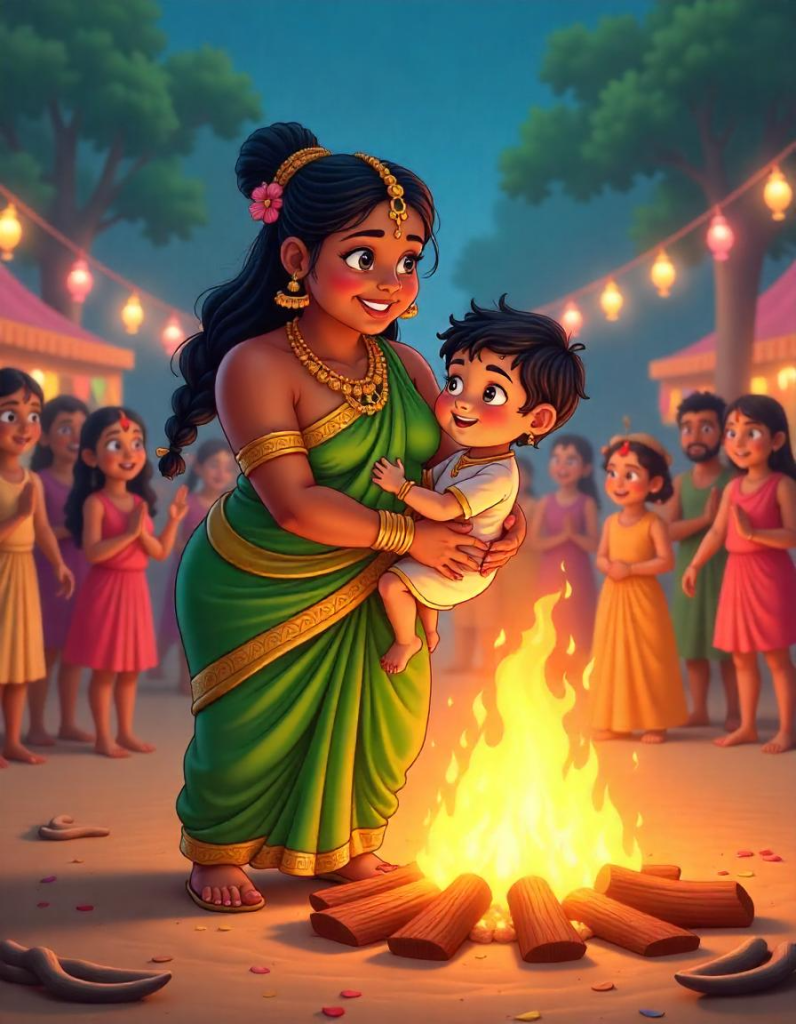Holi, a celebration of colors, marks the triumph of good over evil. It originates from the legend of Prahlada, a devotee of Lord Vishnu, and his tyrant father, Hiranyakashipu. To kill Prahlada, Hiranyakashipu’s sister, Holika, who was immune to fire, sat with him in a blazing pyre. However, Holika burned while Prahlada remained unharmed, symbolizing divine protection. The festival also marks the arrival of spring, unity, and joy, with people playing with colors, sharing sweets, and strengthening relationships.
Indian mythology is rich with tales of faith and devotion, and Bhakta Prahlada's story stands out. While his unwavering devotion to Lord Vishnu is well known, his mother, Kayadhu, remains a lesser-known figure. A woman of virtue and strength, she played a crucial role in shaping Prahlada’s faith despite being the wife of the tyrant Hiranyakashipu.Who Was Kayadhu?
Kayadhu was the wife of Hiranyakashipu, the powerful demon king who sought revenge against Lord Vishnu for the death of his brother, Hiranyaksha. She belonged to the Daitya clan, a race of powerful beings often depicted as asuras (demons) in Hindu mythology. Despite being married to a tyrant, Kayadhu herself was a woman of noble character. She was known for her piety, humility, and devotion, qualities that later influenced her son Prahlada.

Kayadhu’s story is deeply intertwined with the conflict between good and evil. While her husband embodied arrogance and defiance against divine forces, she remained virtuous and spiritually inclined. Her journey as a mother and a devotee is a remarkable tale that highlights the power of faith and righteousness.
Kayadhu’s Ordeal During Hiranyakashipu’s Absence-
During one of his battles against the Devas (celestial beings), Hiranyakashipu was away from his kingdom. Seizing this opportunity, Lord Indra, the king of the Devas, attacked the asura kingdom and defeated its forces. In the process, he captured Kayadhu, who was then pregnant with Prahlada. Indra planned to take her as a prisoner, believing that the child in her womb might grow up to be as wicked as his father.

However, Sage Narada, the revered celestial sage, intervened. He stopped Indra and assured him that Kayadhu’s unborn child was destined to be a great devotee of Lord Vishnu. Narada took Kayadhu under his protection and provided her shelter in his ashram. It was during her stay there that she received divine wisdom. Under Narada’s guidance, she listened to the stories of Lord Vishnu, his greatness, and his teachings. This knowledge not only gave her peace of mind but also influenced the unborn Prahlada, who absorbed these teachings even before his birth.
Kayadhu’s Role in Shaping Prahlada’s Devotion-
While Prahlada is celebrated for his unshakable faith in Lord Vishnu, it was Kayadhu who nurtured the spiritual foundation within him. The divine knowledge she received from Narada became an integral part of Prahlada’s upbringing. Unlike his father, who wanted him to become a powerful ruler filled with hatred for the gods, Prahlada grew up with deep devotion towards Vishnu.
Despite being surrounded by a palace filled with demonic influences, Kayadhu ensured that her son remained pure-hearted. She protected and encouraged his devotion, even when it angered Hiranyakashipu. She never discouraged him from his beliefs, even though she knew that it could bring them into conflict with the mighty king. Her silent strength and faith became a guiding force in Prahlada’s life.
Kayadhu’s Silent Strength Amidst Turmoil-
When Hiranyakashipu discovered that his son was a devout follower of Vishnu, he was enraged. He tried every possible way to change Prahlada’s mind—through persuasion, threats, and even severe punishments. But nothing could shake Prahlada’s devotion. Kayadhu, as a mother, witnessed her son being subjected to immense suffering. Yet, she remained strong, trusting in divine justice.
Unlike her husband, who was blinded by his arrogance, Kayadhu displayed the virtues of patience and resilience. She did not oppose Hiranyakashipu openly but remained firm in her belief that her son was guided by a higher force. Her silent support for Prahlada was a testament to her wisdom and courage.
The Turning Point: The Fall of Hiranyakashipu-
The conflict between Prahlada and Hiranyakashipu ultimately led to the appearance of Lord Vishnu in the form of Narasimha, the half-man, half-lion incarnation. Hiranyakashipu’s relentless attempts to harm Prahlada resulted in his own downfall when Narasimha emerged from a pillar and destroyed the tyrant king.
Kayadhu, who had endured years of turmoil, finally saw justice prevail. She witnessed how the power of devotion triumphed over arrogance and hatred. Her son’s faith had been vindicated, and her role as a mother who silently supported righteousness was fulfilled.
Kayadhu’s Legacy and Her Significance-
Though Kayadhu’s story is not as widely discussed as Prahlada’s, she holds a significant place in Hindu mythology. She represents the virtues of patience, devotion, and silent strength. She was a woman caught between the forces of good and evil, yet she chose to uphold righteousness in her own way.
As per vamaindia.in, Kayadhu’s story teaches us the importance of a mother’s influence in shaping a child’s character. Her willingness to embrace divine wisdom despite being born into a family of asuras shows that true devotion transcends birth and lineage. Her nurturing presence in Prahlada’s life reminds us that behind every great devotee, there is often an unsung guiding force.
vamaindia.in wishes everyone a very Happy Holi!


